Just last month, I visited Indonesia in my new capacity as Rare’s President. I have supported work in Indonesia for over 15 years, and I never tire of experiencing its incredible natural wonders—its biodiverse marine habitats, cultural richness, inspiring people, and vast and elaborate seascape.

But on this trip, I traveled in the shadow of the latest synthesis report from the Intergovernmental Panel on Climate Change (IPCC AR6). This latest report makes clear that even under the best scenario, the impacts of climate change will be felt globally well into this century. And in that climate shadow is the reality—that adaptation to climate change is not a choice but an imperative for the more than 40 million Indonesians living in low-lying areas nationwide and the millions of Indonesians who call its coasts home or rely on them for food and income.
Like my field visits to Rare in Honduras and Colombia over the last six months, I was deeply inspired by Rare’s approach in Indonesia and our work to support the vulnerable frontline communities on the country’s coasts. These communities are disproportionately affected by climate change, despite being the least responsible for the emissions fueling it. Globally, sea level rise, flooding, extreme weather, and warming oceans are debilitating resource-dependent communities, more so in the Global South’s warmer waters, like Indonesia.
While it’s been starkly illuminating to experience our work in Indonesia’s climate change context, something I had seen in our work has been sticking with me since I returned home. Indonesian people are adapting and innovating despite rising sea levels and other destabilizing climate change impacts. They are maintaining hope. And they are taking action. Individuals, communities, and governments are working together to build more resilient ecosystems and sustainable economies to mitigate and adapt to climate change.
During my trip, I learned how Rare has been working closely with the Indonesian government and its small-scale fishing communities for years to facilitate more sustainable and community-led fisheries management. When Indonesia delegated management of the country’s territorial seas (out to 12 nautical miles) to provincial governments in 2004, it paved the way for co-management approaches to coastal fishing. So it was incredible to hear that Rare has supported the Southeast Sulawesi provincial government’s approval of another eight ‘managed access’ fishing areas in the province, in addition to the first ones approved in the country in 2022 (the former areas await final legal registration).

Securing rights for communities to co-manage and conserve their nearshore fisheries is at the core of Rare’s coastal fisheries program, Fish Forever. Worldwide, Rare has helped support community-led declarations of 58,000 sq kilometers (km) of the ocean under community co-management. In Indonesia, Rare has helped support over 4,700 sq km and is in the process of helping create co-management for more. Through Rare’s work with the government, Indonesia’s more than 2 million small-scale fishers now have a path to exercise the right to manage their nearshore fisheries for resilience. Not only does this new management authority give coastal fishing communities the legal basis to access and manage their fishing grounds and nearshore waters, 0-2 nautical miles from shore, but it shows that the provincial government is taking community-based fisheries management seriously.
Small-scale fishers’ combined impacts—on improving livelihoods, ensuring food security, and protecting their coasts across biodiversity-rich coastal waters—are anything but small. They establish marine reserves, steward nearshore fishing grounds, protect nurseries, and build more inclusive coastal economies, which are the key ingredients to more resilient futures. Decentralizing management rights to these communities and their local governments has already boosted the sustainability of fishery catch and habitat conservation for coral reefs, mangroves, and seagrasses and enhanced communities’ social resilience through financial inclusion. Rare has even supported Indonesian communities in establishing 65 Savings Clubs to help fishers and their families build wealth and buffer against unexpected economic shocks.

Rare has not only supported over 500 communities across Indonesia to adapt to climate change, but we have a blueprint for helping communities adapt to climate change across the Indo-Pacific. And we have our sights set on mitigation measures. In Brazil and Mozambique, we support increased protections for “blue carbon” in mangrove and seagrass ecosystems that store more than 10x the carbon per hectare than the world’s forests. In Colombia, we support scaling regenerative agriculture practices to help smallholder farmers boost productivity, enhance soil carbon, and protect biodiversity. And in the world’s largest polluter, the United States, we are actively working to support individual and community action to decrease carbon emissions through high-impact actions that maximize individual climate action.
The scale of the climate challenge is daunting, especially set against the stark image of rising seas and coastal communities fighting for their livelihoods. But I returned from Indonesia hopeful and inspired by what is possible when communities on the frontlines of climate change can use their power to yield real results for people and nature. When given rights to manage and access their resources, Indonesia’s fishing communities increasingly act as guardians of the coastal ocean—their most vital approach to adapting to climate change. Their actions should be an inspiration to us all.